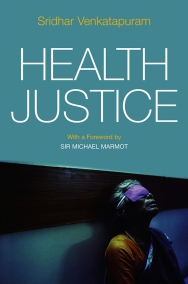Health Justice by Sridhar Venkatapuram will do you good. It is good to read scholarly material in a field that is related to one’s own but separate from it. It is also good for clinicians, used to treating relatively rare disorders in individual patients, to look across to the subject of ‘Health’ as opposed to the ‘Medicine’ of their professional life.
Comments on the volume’s back cover include the assertion ‘Do not mistake Sridhar Venkatapuram’s Health Justice for an arcane treatise of interest to a small number of political philosophers’. Only a political philosopher could conclude that the volume does not read rather like a thesis but, at about 270 pages of text, it is short enough (just occasionally one feels it might have been shorter) and the writing style is clear, if not impeccably elegant and engaging.
Technical (philosophical) terms inevitably feature (always with some explanation). Of course, most just add a little to reading effort for a non-philosopher, although some add to the enjoyment. I am glad to know that ‘meta-right’ refers to the right to have policies formulated such that a ‘primary’ right comes closer to being achieved. In the festive season full of brands and commercialism, I was glad to be reminded that etymologically ‘cosmopolitan’ refers to the ‘universal city’ and that ‘cosmopolitanism’ is the philosophy that all human groups belong to a single community with shared morality.
At the core of Venkatapuram’s argument is the idea that ‘Capabilities’ for health should be regarded as fundamental human rights. That is, factors that undermine health in the biological, physical and social environment (HIV policy, poverty etc) may usefully be addressed on the international stage by judicial and political processes alongside issues of abuse and general inequity. This contrasts with the more traditional view in Philosophy whereby diseases, and disease risk, were regarded as too unpredictable to underpin any system of ideas that, in turn, might aspire to inform international Politics and Law.
It is only after setting the book aside for a while that clinicians, for whom the morality of striving for the health of their patients underpins daily life, may realize that Venkatapuram’s writing is rather bold, and appealing. Personally, I see parallels with the recent furore concerning British prisoners’ voting ‘rights’: my original sense that the human rights adjudication on this point was irrelevant, if not counter-productive, has evolved. We should expect the consensus on human morality to evolve, as the scientific/neuroscientific consensus does. And as clinicians we may be expected to have greater clarity of thought on the matter, certainly, than I usually would at the end of a morning in the Outpatient department.
Health Justice would be an eminently justifiable medical library purchase.
